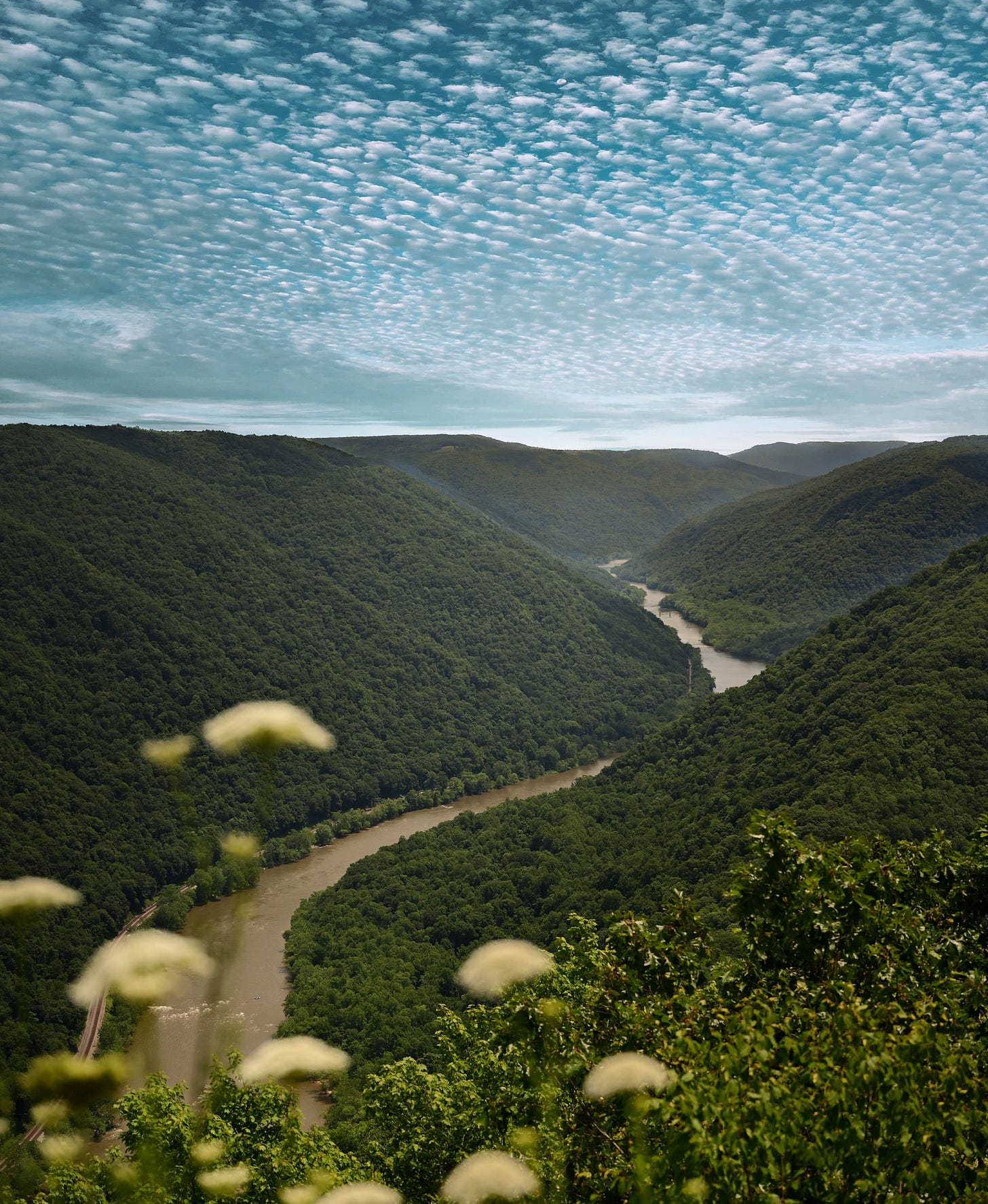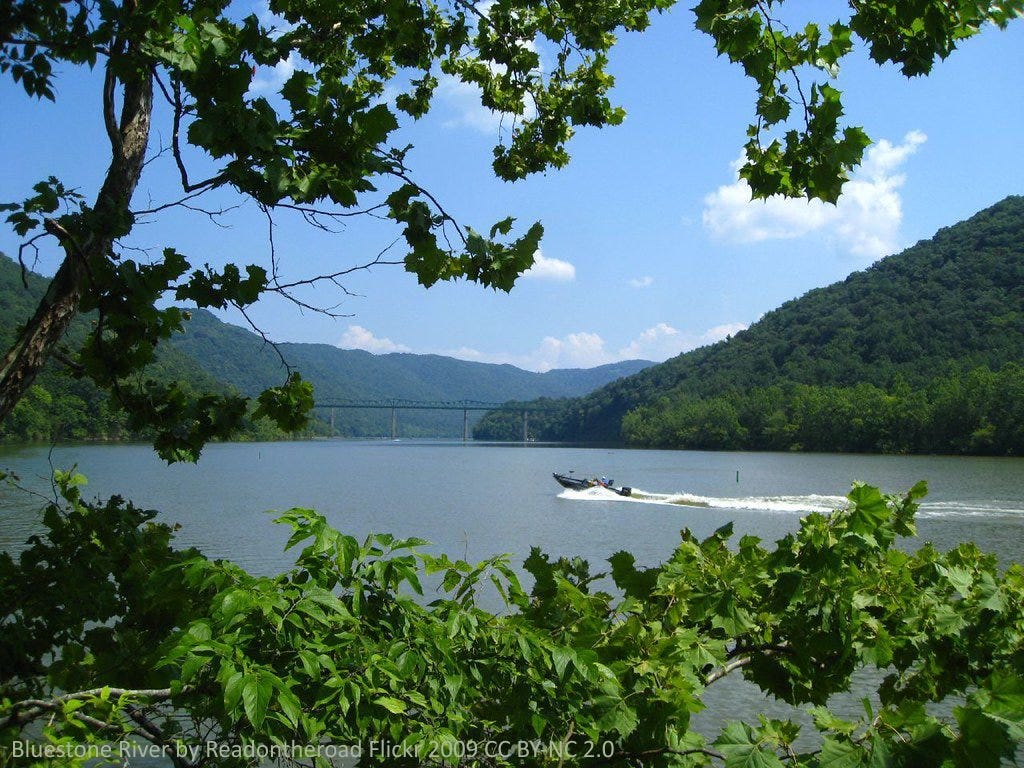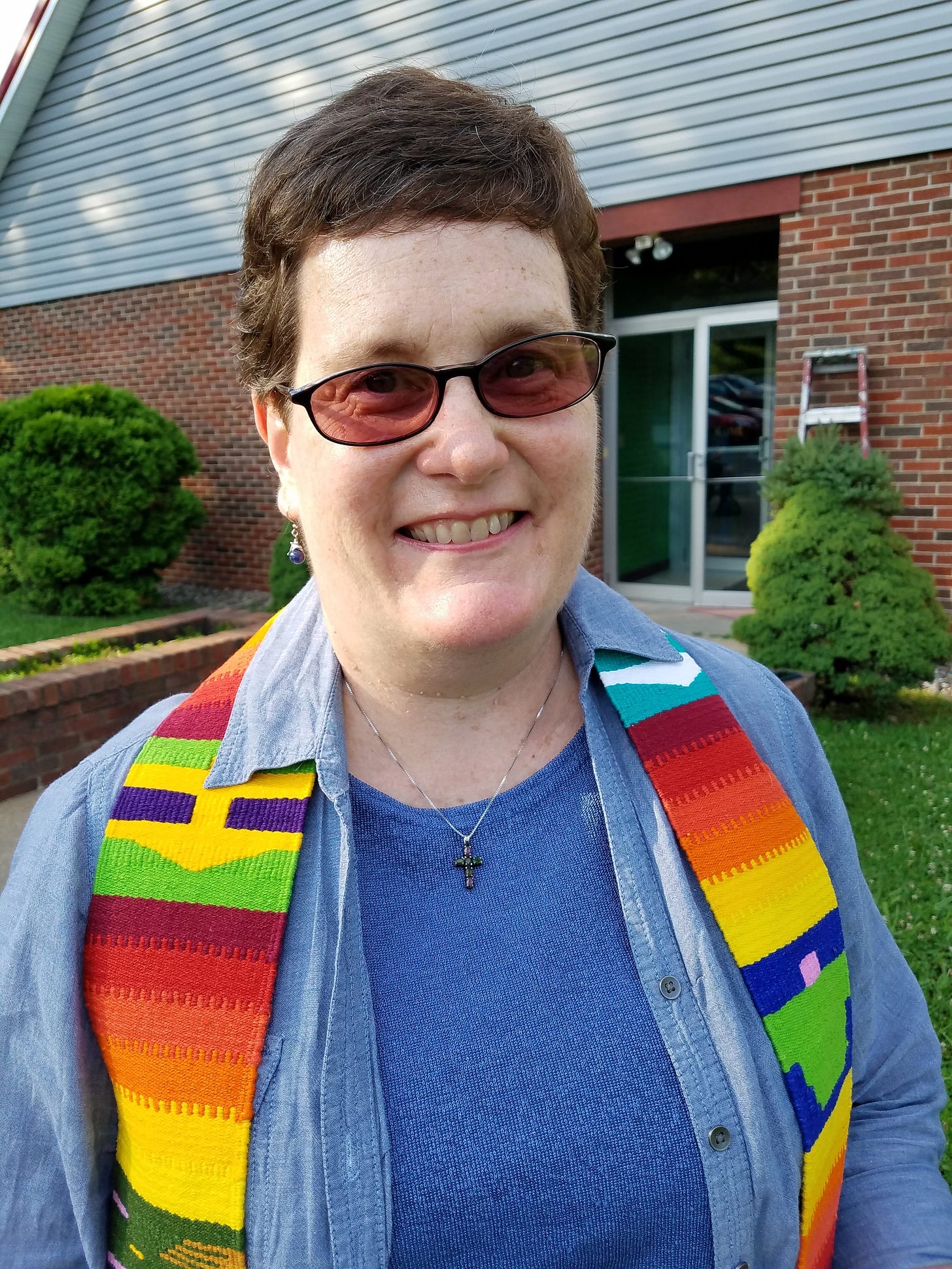“Somehow or another, I fell in love with West Virginia.”
Allen Johnson, Christians for the Mountains
In the mountains and valleys of West Virginia is a scenery to capture your very being, to take your breath with majesty, flowing waters, with green crested mountain tops ridged together like lush waves against the God’s liquid blue sky. Yet against this beauty is another reality—mountaintop coal mining, where these same mountain ridges are destroyed by heavy blasting. Proud peaks touching heaven make way for coal, as vast mountaintop mines remove the forests, soils, and rock. All for the narrow seams of coal. The rubble is tossed into valleys, clogging stream beds while fine, cancer-causing particulates fill the air, impacting nearby communities.
It is not surprising, then, that West Virginia has long been at the center of national conversations about energy, industry and environment. Rev. Robin Blakeman, of West Virginia Interfaith Power and Light, and Allen Johnson of Christians for the Mountains joined the Climate Cafe Multifaith to talk about the history and hoped-for future for creation justice in the mountain state. (Scroll for their full bios.)
In the video clip above, Rev. Robin Blakeman and Allen Johnson speak to their love of West Virginia and their concern for the environment.
Johnson introduces himself at the Cafe by demonstrating a fundamental truth for West Virginians: a love of their home state. Johnson lives by the Virginia line and the Monongahela National Forest. “Where I live, the first week or two of June it is the prettiest place in the world,” he says. “In springtime, it is absolutely gorgeous as the leaves come out in the trees…Everything greens up, it is stunning. “
Johnson didn’t always live in West Virginia, he grew up in the Midwest, and after he married he and his wife moved to Kentucky, and from there, says Johnson, “I fell in love with Appalachia.” It wasn’t easy to make a living, but “we figured it out eventually,” raising their children in a county where two thirds of the territory is state owned land.
The beauty of West Virginia instilled in him a deep love of God’s creation, but it was a trip to Haiti in 1993 that changed the direction of his life. He went on a relief trip, and witnessed a country of violence and poverty. The extraction of resources in Haiti meant the once beautiful country had been deforested, the soil washed away, and what was left was “basically a moonscape” filled with poverty and violence. Says Johnson, “I came back a changed man.”

“We're not respecting the boundaries. We're not serving the planet. We're plundering the planet.”
—Allen Johnson
Johnson went to seminary, earning a Masters in Theology with an emphasis on Public Policy. He discovered likeminded people and faith-based organizations “active in environmental advocacy” and committed to stewardship and preservation. Says Johnson, “we came together in Charleston, West Virginia. One of our excursions was to see a mountaintop removal operation on a little place on Kayford Mountain.” The group, organized by Bob Marshall and Larry Gibson, held prayer vigils on the mountain. They worked together and Christians for the Mountains was formed, a faith-based organization working to stop the destruction of coal mining, especially mountaintop removal.
Rev. Robin Blakeman is an 8th generation West Virginian. Rev. Blakeman is an ordained Presbyterian minister doing environmental justice work and environmental education. She gained a love of God’s creation as a girl. “I had the privilege of going to a summer camp in the hills…along the Greenbrier and Bluestone Rivers, called Blue Stone Camp and Retreat,” she explains. She credits the camp with “my formation and environmental respect.” All that kayaking, backpacking and canoeing instilled a love of nature that “has been a part of the core of who I am, ever since.”
“There's a lot of interconnection, or what I call enmeshment, in West Virginia between people who work on environmental issues and know each other. We're all really one big family.”
Rev. Robin Blakeman, West Virginia Interfaith Power and Light
It was a period of absence from West Virginia, however, that really woke her up to the environmental destruction and toxic legacy of industry in the state. “It took going away from this place, and then coming back before I really woke up,” Rev. Blakeman explains. “I just didn't recognize the problems of strip mining and coal fired power plants, and a lot of other things when I was growing up…. I came back with a different perspective….I could see the damage that these things were doing.”
The damage being done wasn’t just on a mountaintop far away. The coal industry threatened her family home. “It actually took a coal mine company encroaching on some of my family's property and damaging a portion of that property,” explains Rev. Blakeman. Her parents had to hire a lawyer and go head to head “with the big guns from the coal company.” This was the turning point, she says, “I really, really woke up…and when I did, I was fully and wholeheartedly against the exploitation of the land and the people, that was happening in my home state.”
In the above video clip, Allen Johnson and Rev. Robin Blakeman speak to some of the history of coal mining and industry in West Virginia, and the impact of climate change, as well as a vision for a stronger West Virginia in the future.
Rev. Blakeman’s work has now and in the past included clean up and preservation efforts, advocacy—in speaking out about the destruction of coal, petrochemical, and other industries—and energy efficiency education. In West Virginia, between coal mining waste, toxic dumping, depopulation and poverty, there is a lot to talk about.
For example, the scale of water contamination by Dupont on the Ohio River inspired a feature film, Dark Waters, in 2019. This story is among the most egregious in the nation, as for decades Dupont had been dumping PFAS and PHOA, ‘forever’ chemicals, into the Ohio River near Parkersburg, West Virginia.
Water contamination made the news also in January 2014 when a coal industry cleaning agent, 4-methylcyclohexane methanol or MCHM leaked from a Freedom Industries tanker into the Charleston River, impacting 300,000 people, closing schools and businesses, and adjourning the state legislature. Then another spill within weeks, this time 100,000 gallons of coal slurry containing heavy metals, coal particulates, and the cleaning agent MCHM, spilled by Patriot Coal blackening Fields Creek a tributary to the Kanawah River.

“We are what I refer to as a resource colony—and we have been for decades, if not hundreds of years. We are an extraction state. Most of the minerals and wealth go out of this state, they do not stay here.”
Rev. Robin Blakeman
There is nothing new in West Virginia about heavy metals, petrochemicals, and coal extraction. Rev. Blakeman sees a direct link between extractive industries and health and poverty impacts in the state. “We are what I refer to as a resource colony—and we have been for decades, if not hundreds of years. We are an extraction state. Most of the minerals and wealth go out of this state, they do not stay here.”
Mineral extraction and spills deplete the resources of local communities, meaning basic human and community needs go unmet. Explains Rev. Blakeman. “We have a lot of issues with poverty, with drug addiction, and underfunding of schools and libraries, lack of adequate medical care and lack of adequate hospitalization.”
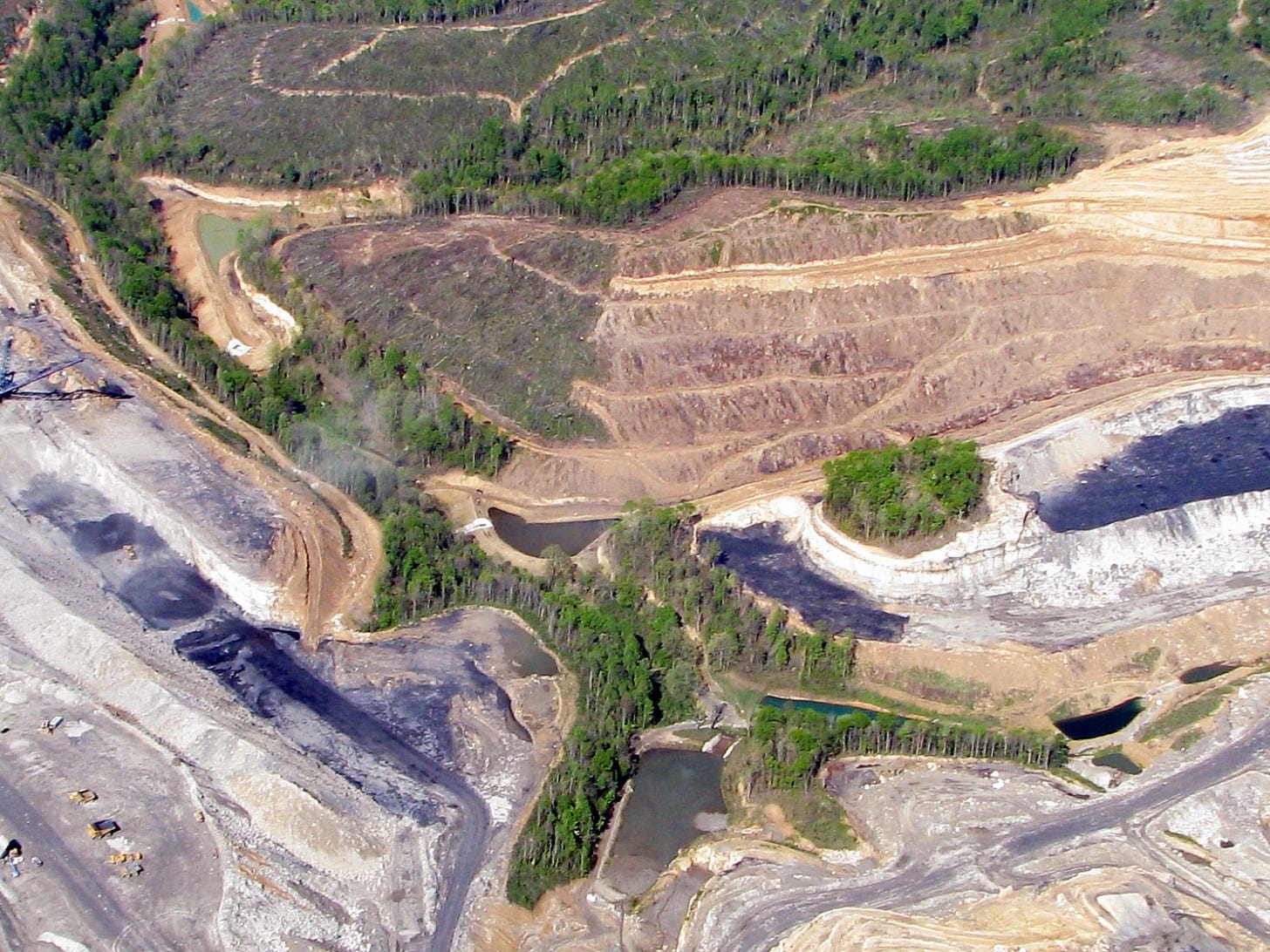
It can be challenging to make changes as the legislative powers and industrial titans enjoy tremendous power in West Virginia, as in many places. However, when coal interests—or pipelines such as TransCanada’s Mountaineer Pipeline—employ legal tactics to take people’s land, threaten to destroy people’s homes, and/or encroach on cemeteries, that is often a point where people come together.
Explains Rev. Blakeman, “cemetery preservation work was a powerful time of coalition between faith leaders, property owners, descendants of certain cemeteries, African American residents, and white residents…[because] in West Virginia, one thing you don't want to mess with are people's ancestors and their graves.”

“In Appalachia one of the key things and most important strengths overall is family connections. I've noticed people move off to the south or go up north …for the jobs or their holidays. They were always coming back home to West Virginia and Kentucky and places like that—the home place. There's a huge, tremendous connection with the land.”
Allen Johnson
Concerns around the health of family and community members is also a way to build coalitions that bring West Virginian’s together across other divides. While stream pollution can be immediately evident, the links between human health and other contamination can be less clear. In particular, West Virginians who are concerned about fine particle air pollution have been organizing.
Of special interest is the connection between illness and mountaintop mining sites. A big factor in above-average death rates in those areas may be the presence and persistence of tiny particulates in the air, measured at PM 2.5, 5 and 10. These tiny particles are known to impact human and animal health as they can embed deep into lung tissue and cause inflammation and all sorts of health problems, including cardiovascular issues, asthma and cancer, they cross the brain barrier and enter the placenta, impacting maternal and baby health. (American Lung Association.)
Environmental organizers in West Virginia have made strides toward passing federal legislation to pause mountaintop removal until the health of those who live near the sites can be studied, especially as concerns the particulates. Johnson has been involved in the coalition for years. For a while they lobbied congress out of the United Methodist building in Washington DC. Some study has already been done, and “the results were devastating,” says Johnson. “This blasting puts out silica and also these chemical that create a very micro size, much smaller than 2.5, that go right into the bloodstream.” (See EPA information and the American Lung Association.)
A study was begun, but shut down in 2017. A new bill sits in the House Natural Resource Committee and so far there has been little movement. The bill is H.R. 2073, the ACHE Act (Appalachian Communities Health Emergency Act). Read the Press Release.
A key reason to study health and other impacts is to help turn the corner on the destruction wrought on the land and community for generations. The more that comes to light about the toxicity of petrochemicals and coal, the bigger the push to find a better way. Says Johnson, “Every environmental group that I know of is trying to work on legislation or develop, from the ground up, programs to build a new economy, a sustainable economy, a clean economy.”
In the above video, Rev. Robin Blakeman and Allen Johnson share their hopes in looking ahead for West Virginia.
One avenue of hope is that as climate change is more evident, more people are talking about it. Says Rev. Blakeman, “Our youth seem to be waking up to the problems of climate change on a rapid scale, and coming out discussing it. Of course, there's still some who are in families where that topic can't be discussed openly…but it's becoming more commonplace to hear people talking about the realities of climate change.”
One reason for this is shift in perspective is the evidence, everywhere, such as in the flooding catastrophes over the last few years. “My hometown Huntington just had a four inch rainfall in less than 24 hours last week,” says Rev. Blakeman. “We're getting what would be called 500 year or 1000 year floods at least once a year in some part of the state—we've had two of them in Huntington this year.”
Renewables and government money to clean up the mess coal barons have left behind are both hopeful next steps that could lead to a cleaner environment and reinvestment in West Virginia’s communities. While they’ve made little progress with their legislators, notably Senator Manchin who is frequently in the news, the focus can be, and has always been community in West Virginia. Says Johnson, “I think that we can bring people together on those common attributes of good jobs, a clean environment, and keeping our kids” at home in West Virginia.
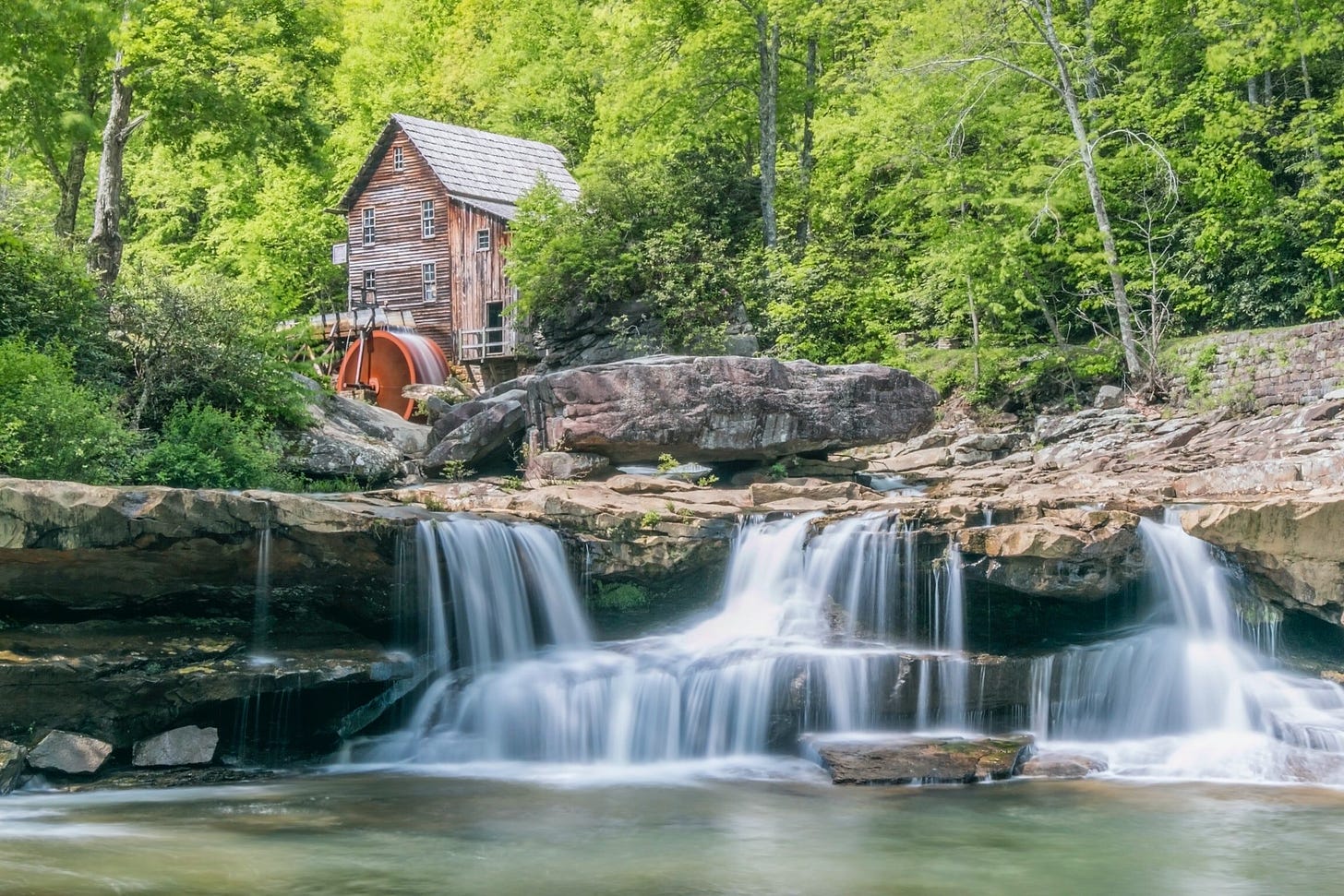
“We're trying to get good jobs back in, rebuild our communities back again, and maybe keep some very talented young people from leaving.”
Allen Johnson
The promise of good jobs is a real hope-bringer for Johnson. “When coal waste is exposed to air oxidization, the heavy metals leach out and pollute streams terribly—sometimes you've seen them run red,” explains Johnson. “The money coming in from the federal government can be used to rectify acid mine drainage… Those are jobs if we can get the funds to come in…. They can be good paying jobs, they can re-strengthen and repair some of this damage.”
In addition to optimism around jobs—including a pilot project in South Charleston to manufacture electric school buses—Rev. Blakeman sees small but important next steps. She finds hope in the energy efficiency work she is doing, for instance supporting local churches to put solar panels up, and pairing that with energy storage for emergencies.
Johnson sums up the hope well, “With funding and guidance and so forth, and building communities one by one—that's a strength that we can tap into, helping these small communities be little bright lights to shine.”
A few articles for follow up:
From the New York Times, How Chemical Companies Avoid Paying for Pollution. DuPont factories pumped dangerous substances into the environment. The company and its offspring have gone to great lengths to dodge responsibility.
The National Religious Partnership for the Environment addresses toxic water pollution.
Website with trailer for the 2019 movie about DuPont and the Ohio River, Dark Waters.
WV Gazette Mail Op-Ed by Janet Keating, OCEV, addressing the January 2014 Charleston Water Crisis.
WV State Attorney General Press Release, Former Freedom president sentenced to prison for role in chemical spill
Another day, another river ruined by a big coal-industry spill, an article covering a 100,000 gallon coal slurry spill in February 2014.
Health Impact of Air Pollution from the American Lung Association.
An article on the Mountaineer Pipeline explosion in 2018. TransCanada's New 'Best-In-Class' Gas Pipeline Explodes in West Virginia, Causing Fiery Blast, and ongoing resistance to the pipeline.
Green Power Motor Company announced in January 2022 that Zero-emission, all-electric school buses to be manufactured in West Virginia. Read the latest on this pilot program launch from WVPB W.Va. Electric School Bus Pilot Project Announced
May 2022, Huntington, WVa, Sees Severe Floods for 2nd Time in 9 Months
A legislative effort to pause mountaintop removal and study air quality and health. H.R. 2073, the ACHE Act (Appalachian Communities Health Emergency Act). Read the Press Release.
What you can do to help:
Support House Bill 2073, the ACHE Act, a legislative effort to pause mountaintop removal and study air quality and health. H.R. 2073, the ACHE Act (Appalachian Communities Health Emergency Act).
This article first appeared on Faiths4Future.org. For more articles, also news and information, see the Faiths4Future blog page.
Robin Blakeman is an ordained PCUSA minister, with a validated ministry in environmental stewardship work within the bounds of the WV Presbytery. She is an 8th generation West Virginian, a mother of a music educator, and currently works full time as the Executive Director of Energy Efficient West Virginia. She is also a Steering Committee member with WV Interfaith Power and Light. The photo of Rev. Blakeman is from a solar rooftop dedication on a church in West Virginia.
Allen Johnson lives in rural West Virginia. He co-founded and coordinates the organization Christians for the Mountains which advocates for social justice and ecosystem integrity in the Central Appalachians, especially calling upon Christians to be advocates in this area. Johnson retired from his position as Director of Pocahontas County Free Libraries in February 2012 to devote his full-time to this environmental ministry. Johnson has an MA in Theology and public policy from Palmer Theological Seminary. He is involved in West Virginia Interfaith Power and Light, and is Chair of the Allegheny Blue-Ridge Alliance.
Rev. Richenda Fairhurst is here for the friendship and conversations about climate, community, and connection. She organizes the Climate Cafe Multifaith and serves on the Movement Cafe team with the United Methodist Creation Justice Movement. Find her in real life in Southern Oregon working as Steward of Climate with the nonprofit Circle Faith Future.





